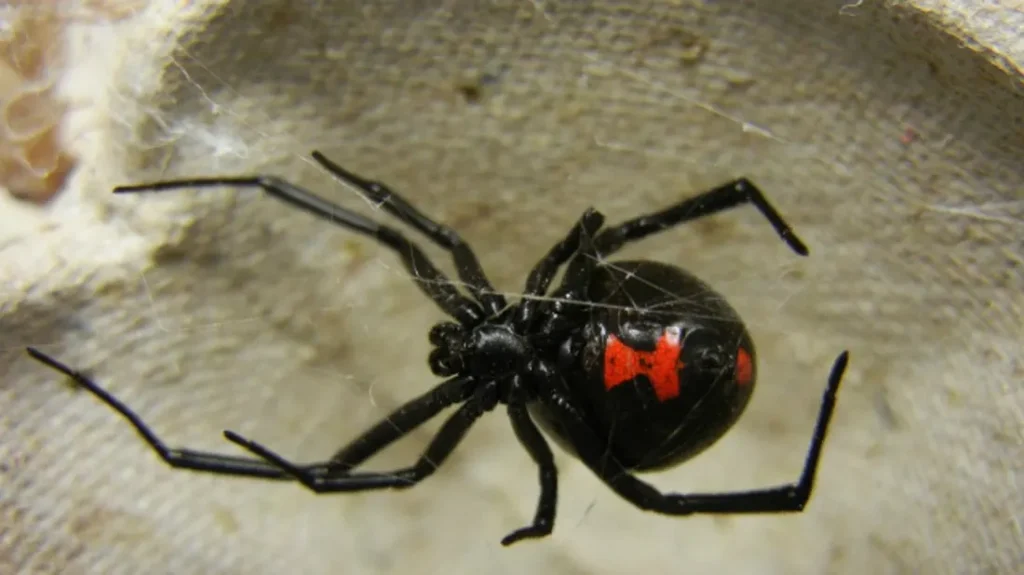
We deal with a lot of creepy crawly bugs here in Florida, but some of these tiny home intruders are more dangerous than others. We’ll dive into everything about southern black widow spiders Florida residents should know, including what they look like, how harmful they are, and when they become a problem.
What Does a Southern Black Widow Spider Look Like in Florida?
Latrodectus mactans, or the southern black widow, is well known for the female’s jet-black body with an orange or red hourglass marking on the underside of her abdomen. The female black widow has a large abdomen and eight-jointed legs.
Females can reach about one and a half inches in length, with males being roughly half that size. Male black widows look much different than the well-known female black widow. They are a light brown or gray color with small red dots.
Unlike other spiders that have a neat web with specific order and design, black widows have a web that often looks messy and chaotic. Black widows typically prefer dark, dry places. Woodpiles, rock piles, sheds, and near the foundation of a home are typical spots for a black widow to create a nest.
Black widows rarely leave their nest, and if you don’t spot the spider when observing the web, the female is most likely hiding. The next time you see a spider web, a messy and chaotic web indicates a black widow may live inside.
Are Black Widows and Southern Black Widows the Same Species?
Yes, a southern black widow and a black widow refer to the same spider species. However, there are closely related western and northern black widows that are very similar to the southern black widow.
The western black widow inhabits much of the western United States, while the southern black widow resides primarily in the south. And, you guessed it, the northern black widow lives in the northern United States, with their habitat reaching Canada.
There are few differences between the three species living in North America other than slight variations in markings and habitat range. The southern black widow has been found as far north as Ohio and as far west as Texas.
As for the southern black widow, Florida residents are lucky enough to see not only this spider, but also the closely related species brown widow, red widow, and the northern black widow on occasion.
Are Black Widows Venomous?
Yes! Black widows are more venomous than rattlesnakes; 15 times more venomous, to be exact. It’s a good thing black widows are smaller and bite infrequently and with tiny doses of venom.
Thankfully, black widows do not bite often. Female black widow bites can occur while defending her eggs. The bite of a black widow behaves like a neurotoxin. Males are just as venomous as females, but they are so small they have difficulty biting humans.
U.S. citizens report roughly 2,500 black widow bites each year. Although an anti-venom does exist, patients typically don’t require it. Usually, doctors will prescribe painkillers to ease the discomfort of the bite.
A black widow bite is rarely deadly, but the symptoms aren’t pleasant. The most common symptoms include redness, pain, and swelling. Nausea, cramping, and sweating are also common side effects of a black widow bite.
When Do Southern Black Widows Become a Problem?
While an occasional black widow nest is unlikely to cause you or your family any harm, an infestation is another story. Another issue with southern black widows is their nest placement. They typically like to build nests on the ground level, which can be a concern for pets or children.
Seeing multiple spider webs is an obvious sign of an infestation. Keep an eye out for a circular, silken sack within the nest. Finding a sack means that up to 1,000 black widow babies may be hatching soon, which may lead to the female black widow behaving more aggressively to defend her eggs.
Schedule Your Free Inspection Today!
While reported southern black widow bites are not common, they can happen. If you notice irregular webs at the bottoms of your doorways or elsewhere on your property, it may be time to contact us.
If you’re concerned about a possible infestation or want to schedule a preemptive service, don’t hesitate to call. Our trained technicians are happy to perform a free inspection to determine your property’s level of risk for southern black widows and other pests.




